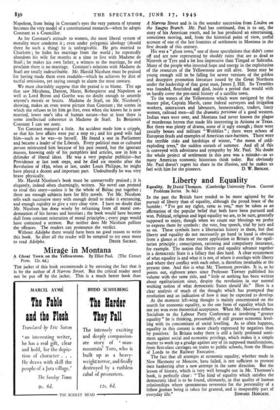Liberty and Equality
Equality. By David Thomson. (Cambridge University Press. Current Problems Series. 3s. 6d.) IN the past the British have tended to be more agitated by the pursuit of liberty than of equality, although the proud boast of the humble : "I've got my rights, same as you," may be taken as an affirmation of the popular belief that both have been pursued and won. Political, religious and legal equality we are, to be sure, generally supposed to enjoy, though when we count our blessings we prefer to express them by symbols : the vote, free speech, trial by jury and so on. These symbols have a libertarian history to them) but that liberty and equality do not necessarily go hand in hand is obvious from a glance at the more recent application in Britain of the egali- tarian principle ; conscription, rationing and compulsory insurance, for example. The notion that liberty and equality advance together in a democratic State is a fallacy that dies hard. 'A clear restatement of what equality is and what it is not, of where it overlaps with liberty and where they conflict with each other, is therefore invaluable at the present time. And this is what Mr. Thomson provides. It is, as he points out, eighteen years since Professor. Tawney published his volume with the same title, and " little or nothing has been written about egalitarianism since, despite the revolution in our normal working notion of what democratic States should 'do." Here is a clear analysis of much of the thought which has prompted that revolution and an indication of how it may be expected to develop.
At the moment left-wing thought is mainly concentrated on the search for economic equality, as the one form of equality which has not yet won even theoretical acceptance. When Mr. Morrison defines Socialism to the Labour Party Conference as involving " greater equality" he is thinking, presumably, of still greater economic leirel- ling with its concomitant of social levelling. As so often happens, equality in this context is more clearly expressed by negatives than by positives: In Britain today there is still a fairly profound senti- ment against social and economic privilege, which makes it a simple matter to work up a grudge against any of its supposed manifestations, from first-class carriages on trains to public schools, from the House of Lords to the Railway Executive.
The fact that all attempts at economic equality; whether made in New Harmony or Moscow, have failed, is not sufficient to prevent men hankering after a new attempt in the same direction. But the lesson of history, which is 'very well brought out in Mr. Thornson's book, is perfectly clear : " The kind of equality which satisfies the democratic ideal is to be found, ultimately, in that quality of human relationihips where spontaneous 'reverence for the personality of a fellow 4iuman being is taken for granted,. and is inseparably part of






































 Previous page
Previous page